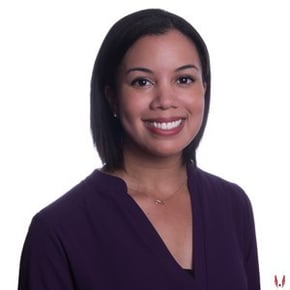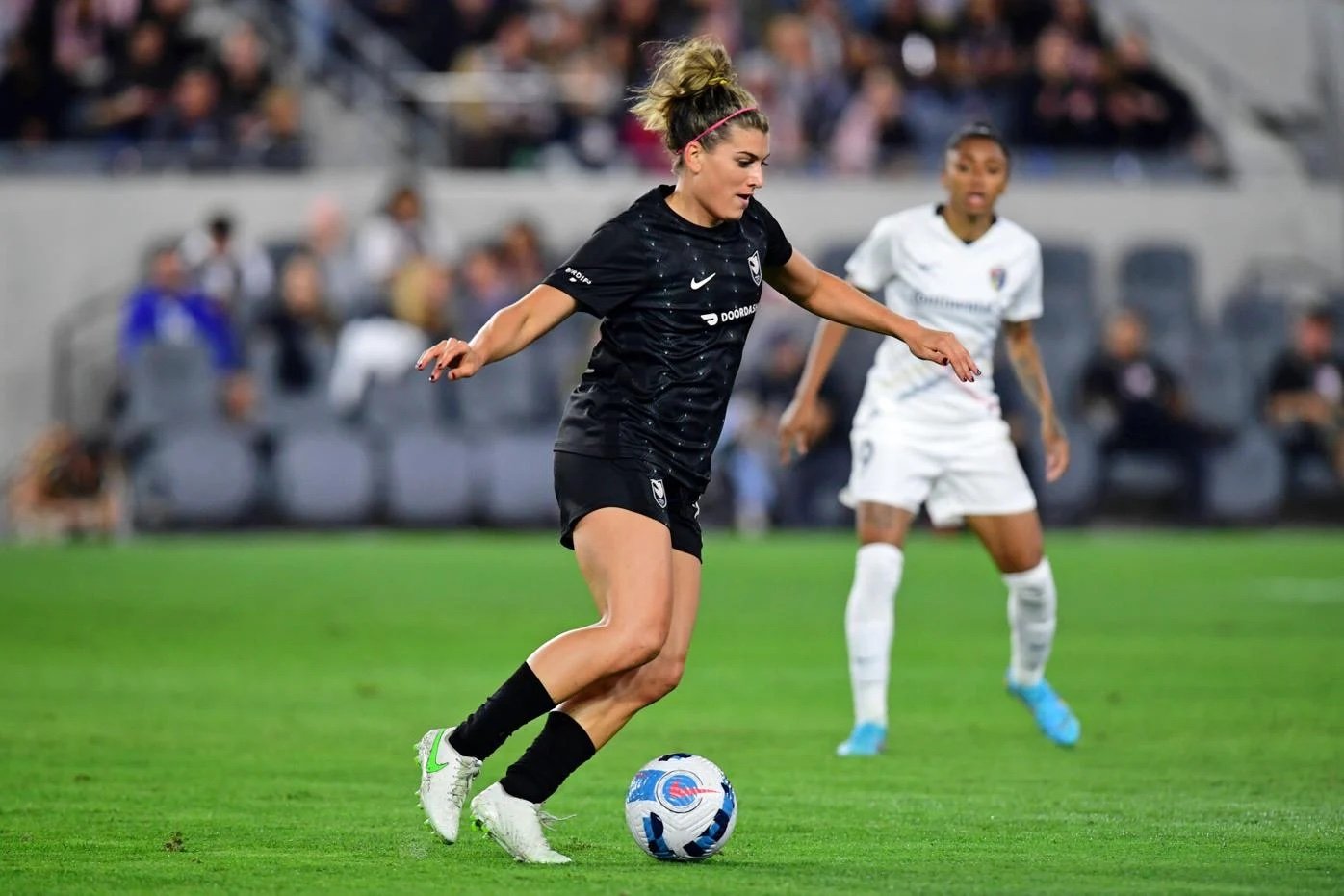
Credit: Marietta Daily Journal
Angel City FC midfielder Cari Roccaro isn't the first professional athlete to speak up about anxiety and depression, but she is the first to successfully help secure unprecedented mental health rights with her league. Thanks to her boldness and the work of the NWSL Players Association, players are now legally entitled to up to six months of paid mental health leave - a first in professional sports.
The 27-year-old mental health advocate spoke to Parity just days after the historic collective bargaining agreement (CBA) was signed, on the same night as Angel City FC's first regular-season home opener.
Let's start by taking it back to when you first fell in love with sports and with soccer, in particular.
It happened at a pretty young age for me. My parents put me in soccer because my sister played. We did dance, tennis, soccer, any camp, any sport -- we just were signed up for. But soccer was always different for me. I loved it right away.
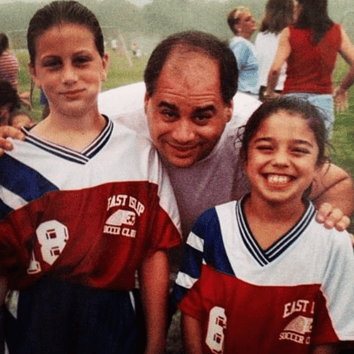
My parents took us to New York Power games in the early 2000s. I got to see these incredible women play and soak it all up as a little kid. Even though I was only six or seven, I started telling people that I wanted to get a college scholarship for soccer and play professionally. I don't think I really even knew what that meant!
Over the years I kept climbing up the ranks, staying competitive, always beating the boys at recess. I was one of those kids who just kept going, going, and going.
Did you specialize when you were that young, or did you play other sports during the off-season?
I was actually a dancer for 10 years, and there was a point in my life when I skipped a soccer tournament for a middle school dance recital. I also ran track in high school for two years.
Once I switched to a competitive club team I thought to myself, "All right, I want to play in college. I want to be on the national team. I want to play on the World Cup team. I want to make the U20 World Cup team. I'm going to just focus everything on soccer moving forward.”
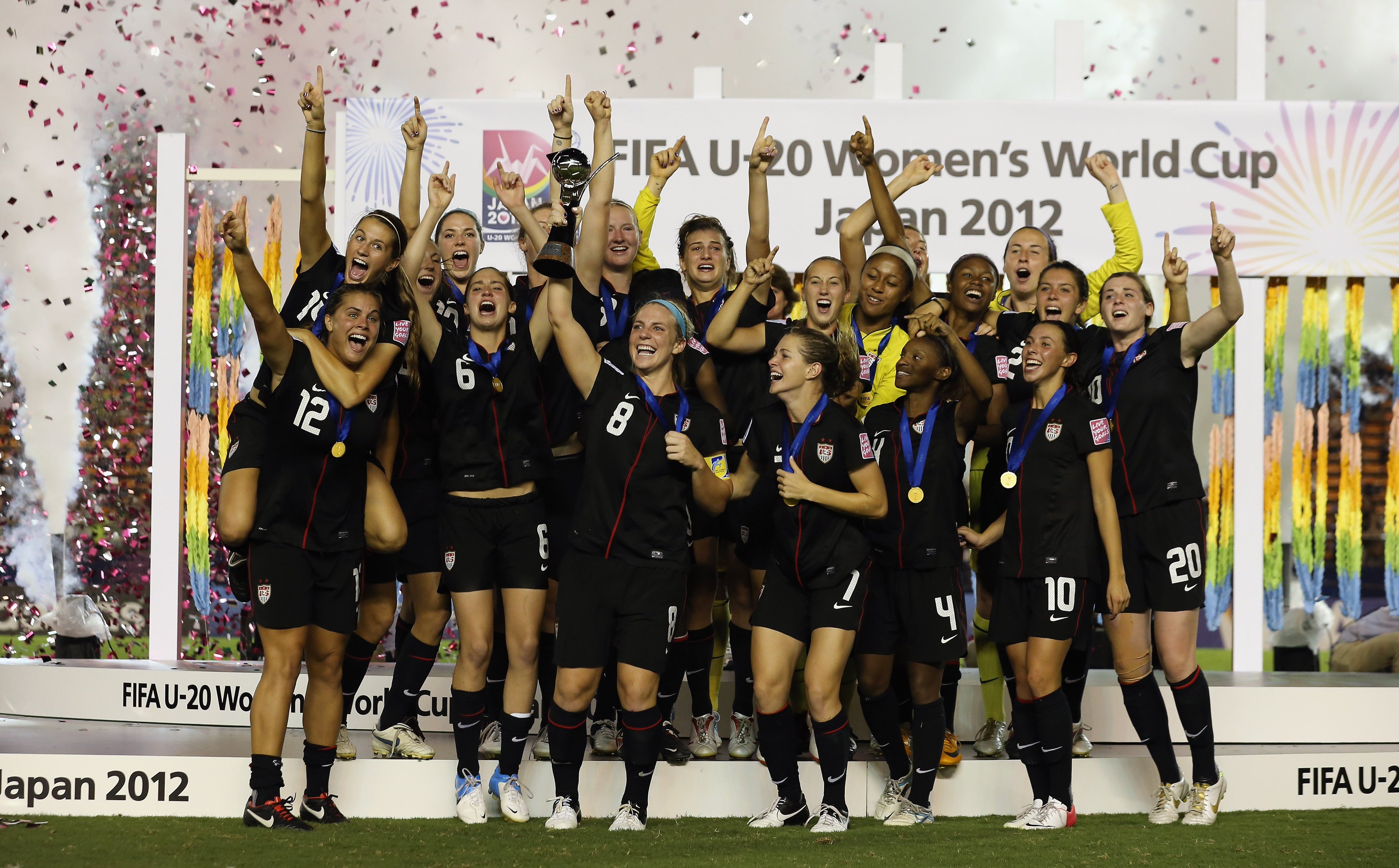
Cari Roccaro (center) with her winning Team USA teammates at the 2012 FIFA U-20 Women's World Cup in Japan. Credit: FIFAWWC (Twitter)
I left my local club team to join a better club team, then got recruited to college. It was a pretty straightforward experience for me, which was incredibly lucky.
You’ve been open about your difficulties transitioning to college. How did you come to the conclusion that you should seek help, and what support system did you have that made you feel that was a safe option?
I had never been to therapy in my entire life. Everything was fine in high school and then I got to college at Notre Dame and I felt like, "Whoa, I'm not doing well with this transition. I'm not feeling comfortable with my classes." Soccer was my only escape. But then also it brought its own set of stresses, because I wanted to win. I felt pressured to do well. I felt a lot of weight on my shoulders coming in as a freshman who had just won the U20 World Cup.
When I was on the field, I could hide it. I was my goofy and competitive self, so my teammates and coaches had no idea. It was when I was behind closed doors that that's when I was really struggling.
The only people that knew were my parents and a couple of my friends from home. My mom told me, "You need to tell Randy [Waldrum], your coach." And I was like, "Okay." But I didn’t do it.
Eventually, my mom reached out to him on her own and he approached me one day after practice. He said, "Let me put you in touch with our sports psychologist for the team." And then the sports psychologist said, "Let me get you to the Counseling Center where you can start seeing someone regularly."
They guided me so gently, and thankfully had the resources available to do so, because I was ready to quit. I wanted to leave and go home. They suggested I try accepting help first and then reconsider. I started seeing a counselor and things slowly started improving. By the end of my first year I was thriving-- loving college, making friends, and establishing a routine.
My parents were super encouraging throughout. I just needed a little boost, some coping tools, and to know that I wasn’t alone. So I stuck with therapy off and on throughout my time in college, and it really helped me.
It’s great you had someone in your life who did for you what you couldn’t do for yourself.
Because I was suffering and my mom knew I was too prideful at the time to admit that. And that's how mental health was for collegiate athletes ten years ago. It wasn't normalized.
I thought, "I need my coach to think I'm strong and can handle Notre Dame. I can't give him any reason to doubt me.” And it turned out that he didn't, he didn't doubt me at all. He just sent me on my way to the Health Center. I got help and he didn't think any different of me. No one did.
I was also put in touch with alumni that had played soccer at Notre Dame. Alums who were once in my shoes and now doing really well as professionals.
At the time I thought I was the only one on my team struggling. I looked around and was like, "What's wrong with me? Why is no one else thinking the thoughts I'm thinking?"
Speaking with former collegiate athletes that I looked up to and hearing that they struggled at one point, too, made me feel less alone. They became like mentors to me.
Absolutely. I want to jump ahead to your own professional soccer career and your role in securing up to six months of mental health leave for NWSL players as part of the Collective Bargaining Agreement (CBA). Prior to this change, if you had a physical injury you would still get paid despite not playing, but those protections didn't apply to mental health illness. Can you walk me through what that was like for you?
Let's rewind to in between the 2018 and 2019 off-season. I was going through some seriously debilitating mental illness and I was not going to come back to play in March. I mean, I wasn't leaving my bedroom. I could barely eat or do anything. How was I supposed to play soccer? I told my NC Courage coaches and the league that I needed to take a leave of absence, but deep down I was considering retiring altogether. I was just biding my time to be able to figure out what I would do.
The league informed me that my leave of absence would be fine... but that I wouldn't be paid. I could start getting paid again once I got into market. So, now I'm completely jobless.
I felt trapped. I wasn't sure if I felt completely comfortable coming back in March, but also like I didn’t really have a choice. Months went by and thankfully I started to heal around January. I tried so hard to show up. I'm really lucky that I was in that phase of my healing by the time preseason started. Had preseason started any earlier, I would have been in a much worse place.
I ended up going back to North Carolina and we won the championship that year. Everything was great, then COVID happened.
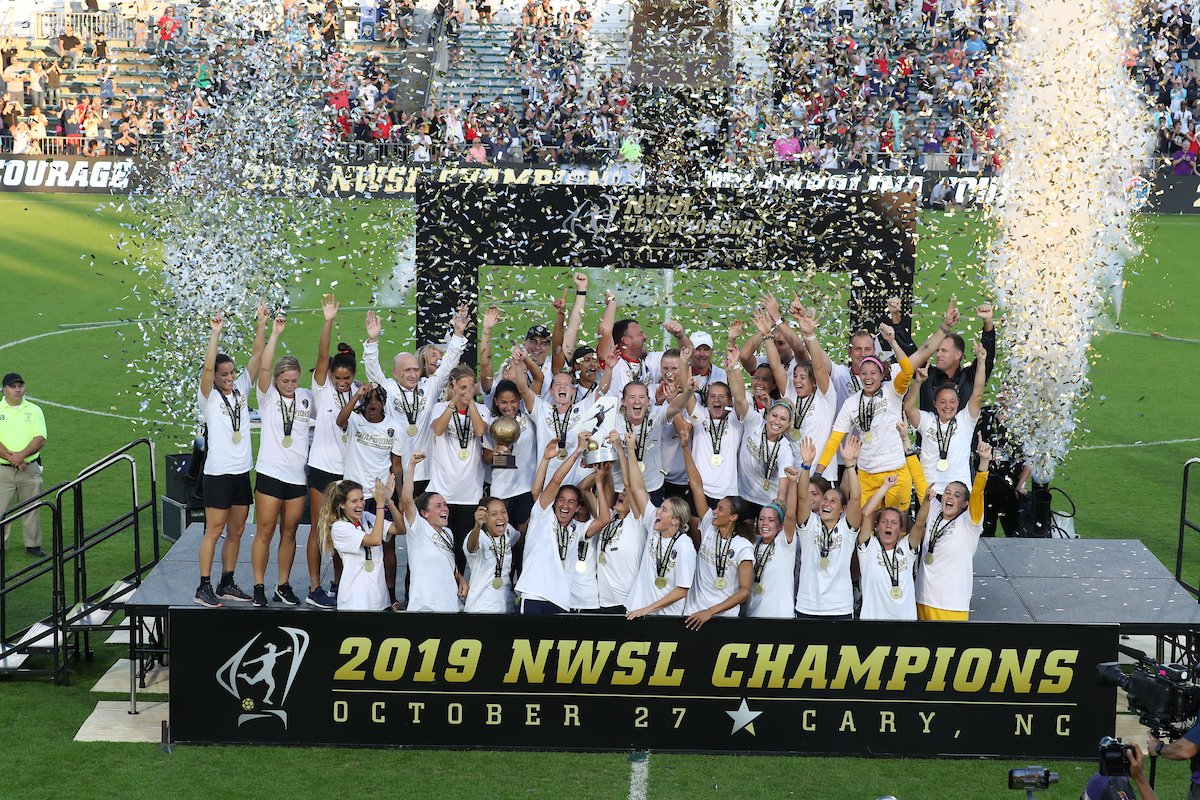 North Carolina Courage celebrates winning the 2019 NSWL Championships in Cary, NC. Credit: NC Courage (Twitter)
North Carolina Courage celebrates winning the 2019 NSWL Championships in Cary, NC. Credit: NC Courage (Twitter)
And everything shut down and everyone’s mental health took a nosedive. Suddenly we’re paying a little more attention to this issue.
Exactly. While I was doing my podcast, Butterfly Road, in 2021, my co-host Ginny [McGowan] and I recorded an episode about Liz Cambage who plays in the WNBA for the LA Sparks, and how there were times she had to miss games for mental health. She would be listed on game notes as DNP (Did Not Play). It's not public that the NWSL players have the opportunity to do the same thing. I've never seen it on an injury report.
Why can't we just make this a little bit more normal, where if someone needs to leave to take care of themselves, they can still do that and get paid? Players with a mental illness should be granted the same resources as those with physical injuries.
I reached out to Meghann Burke, the lawyer for the National Women's Soccer League Players Association, and then my player reps at the time. One of those that was heavily involved was [fellow Parity athlete] Kristen Hamilton, who now plays for Kansas City. I told her about my experience and asked, "Tell me how this makes sense and how can we change it?"
She took it to all the other player reps and they fought for it, along with all of the other things that the collective bargaining agreement now has. But apparently, protected mental health leave was one of the earlier things to get approved.
We got up to six months of leave! That's a lot, and it's now legally in our contracts. You are allowed to go take care of yourself and keep your salary and benefits, which I think allows so many more players to feel comfortable admitting that they need more help.
So many in the league previously would say, "I'm fine. I'll just push through. I'll show up." I'm like, "I'm watching you deteriorate." Now that these players have the opportunity, I'm interested to see how many more take care of themselves earlier before they let themselves get to a worse place.
What was it like to be there when the CBA was finally signed [on April 30 at the Angel City FC season opener]?
It's crazy. Actually, I didn't really know that that was going on. I saw videos and pictures after. I think in general, everything around that game in LA, with Angel City, has just been tremendous and amazing.
History tonight 🤩
— National Women’s Soccer League (@NWSL) April 30, 2022
The 1st #NWSL CBA is signed ✅ pic.twitter.com/mgajYsvIIH
I don't think I've fully processed the entire thing. That was, I think, a historic game for myself, for women's soccer, for Angel City, for the rest of sports history. I got to be a part of all of that. It was really surreal.
Some of my LA friends that came to the game were like, "This is the coolest LA sporting event I've ever been to." I tried to tell people!
I didn't want to speak too soon, but I was saying things like, "It's kind of going to be like the Super Bowl." The Rams were in the Super Bowl and won here so, I don't know if it was quite like that, but I think it was definitely up there as one of the cooler things that LA has done.
It was hard to take all of it in. I was so focused on the game and I kept thinking, "You're playing your old team, [the Courage]." I was looking across the field like, "Hi, everyone!" It was really strange for me.
I loved my team dearly. I was there for four years. We won two championships together. Raleigh was home. I never really got closure from leaving. I just got traded in the off-season, picked up, left, and didn't say bye to anyone.
So my old teammates got to share this historic moment with me in this really weird way, even though they wanted to win. I mean, one of my best friends is on the other team and it was so cool for her to see me doing my thing. I can't really explain it.
It all came full circle where I was closing the chapter with them and also moving forward with Angel City. It was really special, written in the stars.
What is the biggest takeaway you'd like people to have about athletes and mental health?
Everyone's human and people struggle, and they do it behind closed doors. So I think men, women, no matter what pro-league you're in in the United States, having that opportunity, I think, is going to be really helpful for people.
Having that luxury and knowing that you can take care of yourself and still keep your job and it's okay to miss a few games or miss some time with your squad to just go take care of yourself.
It's nice to know that you're being acknowledged as a human being, too. You're not just an athlete, especially those big-timers that make all this big money.
I think a lot of people are like, "No, this is a business and you're my athlete and you're here to do a job and make millions of dollars." It's like, "Wait, this is showing you, I also do care about you as a human, take care of yourself first. Also, would love for you to continue making money for this team and do well. But you need to make sure you're okay as well."
I don't know if it's because I'm on a new team in Angel City or if it's due to the CBA, that we are feeling as if we're cared about as humans first. That's the first time in a really long time for me, which is awesome.
Last question. I did want to ask - and it's very silly - if you watch Ted Lasso?
Oh, of course. Oh my God, yes.
Okay. Because I couldn't help but think of the second season and the therapist, as well as how the team handled (and tried to hide) Ted’s panic attack.
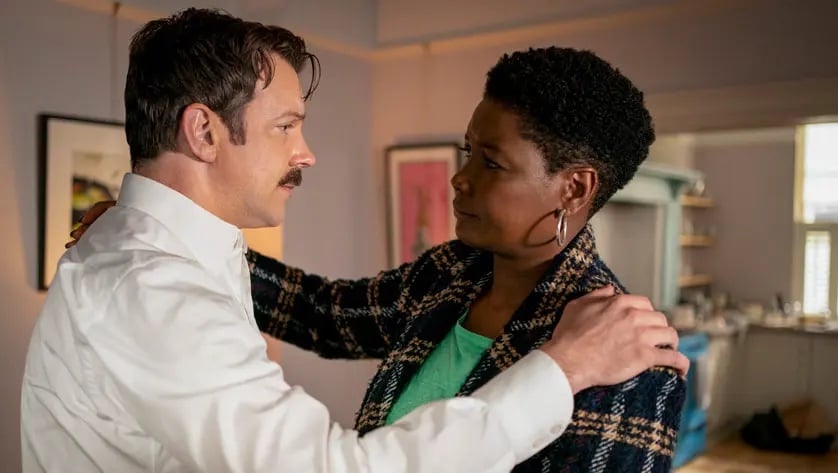
Coach Ted Lasso and team therapist Dr. Sharon Fieldstone (played by Jason Sudeikis and Sarah Niles) combat mental health stigmas in professional sports during the second season of Apple TV's Ted Lasso. Credit: Apple TV
That was interesting and that's how society is. He was like, "Yeah, I don't want people to know." And then it got leaked and it was okay. People struggle. It's out of their control and they'll get help and they're not alone.
It’s so important to normalize this stuff. I feel that I have a platform to speak up, and I’ll continue to because I think it is really important and helpful.
You never know who's listening. You never know who's watching an interview of you or reading something about you and is like, "Okay, I can relate to her. This is going to save me." So I'm going to keep doing it.
You can watch Cari play with Angel City FC this season on Paramount+ and follow her on Instagram at @cari_roccaro.
Note: This interview has been edited and condensed for clarity.
Follow us on Instagram, LinkedIn, Twitter, Facebook, and TikTok to stay up-to-date on Parity news.
